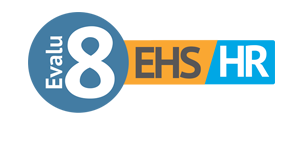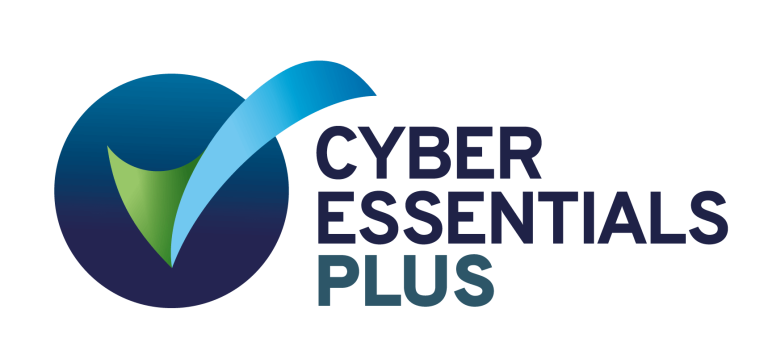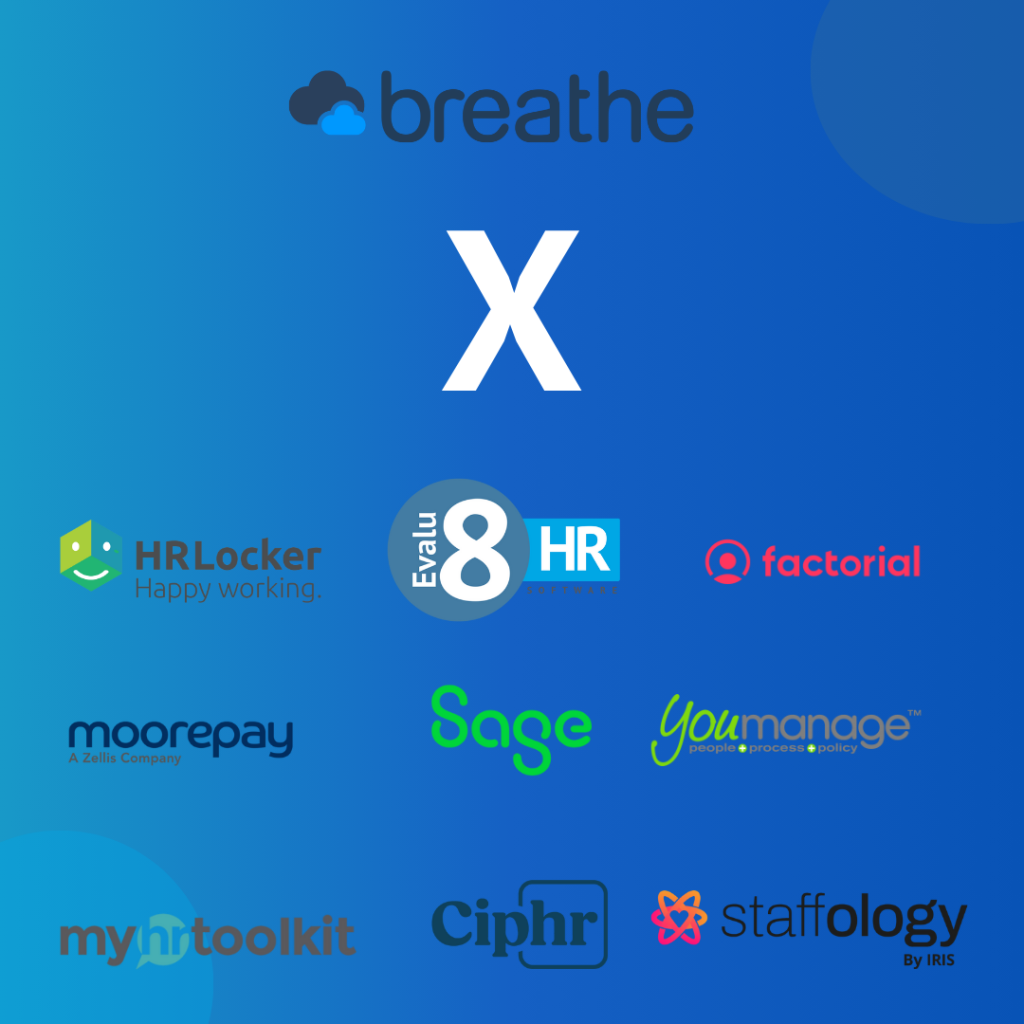
Choosing the right HR software is one of the most important decisions a UK business can make. The right platform doesn’t just store employee records, it shapes how you manage people, rotas, payroll, compliance, and day-to-day operations.
BreatheHR has long been a popular option for smaller UK businesses, but as teams grow and HR needs become more complex, many companies start looking for alternatives that can scale with them.
This article takes a clear-eyed look at 10 of the most credible BreatheHR alternatives for UK businesses in 2025. We’ll assess their core features, advanced capabilities, limitations, pricing approaches, and real-world pros and cons, all with a UK audience in mind.
Our goal isn’t to push one product over another, but to give you a fair comparison so you can decide which system fits your business needs today and won’t hold you back tomorrow.
Helpful summary
Overview:
This article presents an in-depth comparison of 10 HR software platforms used by UK businesses, assessing their core functionality, advanced features, limitations, pricing transparency, and suitability for different business sizes and industries.
Why Trust Us:
Evalu-8 is a UK-based HR software provider trusted by businesses across healthcare, education, manufacturing, security, and other regulated industries. Because we work daily with SMEs that face rota, payroll, and compliance challenges, we understand what really matters when selecting HR software, not just features, but how well they work together in practice.
Why It Matters:
Choosing HR software that doesn’t scale or integrate properly often leads to:
Duplicated data across multiple systems.
Gaps in compliance with UK employment law.
Payroll inaccuracies and disputes.
Frustration from managers and employees alike.
The best solutions bring everything together from employee records and absence tracking to rotas, timekeeping, and performance into a single, reliable system of record.
Evalu-8 HR: Best all-in-one platform

Why Evalu-8 HR stands out
Evalu-8 HR is a modern, UK-built HR system designed to meet the needs of small and medium-sized businesses. Unlike many providers that lock you into bloated packages, Evalu-8 is modular, you only pay for what you need. From absence tracking and document management to rotas, performance reviews, and compliance reporting, it delivers a clean, scalable way to manage people without the enterprise headaches.
Core features
Employee records & self-service: Store contracts, documents, and personal data securely, with GDPR-compliant audit trails and staff access to their own records.
Absence & holiday management: Automated tracking of leave, sickness, and other absences, with built-in accrual rules and approval workflows.
Rotas & workforce scheduling: Plan shifts in advance, link directly to timesheets, and ensure staffing levels meet operational needs.
Performance & appraisals: Track objectives, log one-to-ones, and manage employee development within the same platform.
Mobile app: Employees and managers can book leave, check schedules, access documents, and approve requests from anywhere.
Advanced features
Payroll prep reporting: Export clean, accurate data into UK payroll systems, reducing errors and rekeying.
Compliance monitoring: Built-in tools to support UK Working Time Regulations, GDPR, and sector-specific record-keeping.
Customisable reporting & dashboards: Generate tailored insights on absence trends, overtime, attrition, and other workforce metrics.
Document management with e-signatures: Issue policies and contracts digitally and track acknowledgements.
Integration flexibility: Modular design means you can add performance management, health & safety, or recruitment modules as your needs grow.
Explore Evalu-8 HR
What Customers Say About Evalu-8 HR
It is really intuitive and easy to use. They seem to have thought of everything with this software as everything is in one package, with one place to log in. I can easily keep my details up to date, book holiday, see my shifts, receive and sign documents and view my training record.
Head of People
Training is very thorough, with recordings sent on request for reference Service is excellent, they get back to you promptly. Great platform, that's customisable for the business needs. Competitively priced.
HR Manager in UK
Pricing
Evalu-8 HR starts from just £2.50 per licence per month (minimum 10 users) for core HR features such as absence tracking and document storage. The platform is fully modular and customisable, so you only pay for the modules you need, whether that’s scheduling, time and attendance, performance, or compliance. This keeps costs transparent and predictable as your business scales.
Pros & cons of Evalu-8 HR
Pros:
- Transparent, modular pricing: Starts at £2.50 pppm, with the flexibility to add modules as needed.
- UK-focused compliance: Built with GDPR, HMRC payroll prep, and Working Time Regs in mind.
- Integrated platform: HR, rotas, performance, and compliance all in one system.Strong cost controls and compliance alerts built in
- Powerful reporting: Insights into absence, labour costs, and workforce performance.
- Ease of use: Intuitive design and mobile access make it easy for staff and managers to adopt.
- Scalable: Suitable for 10-person companies today but flexible enough to grow with larger teams.
- Local vendor advantage: UK-based support and product design aligned with UK laws and SME realities.
Cons:
- Hardware clocking in/out options such as biometrics are available through a partner
- Complex industry-specific rules may require setup support but all training is included as standard
- Payroll is connected through CSV export/import
YouManage
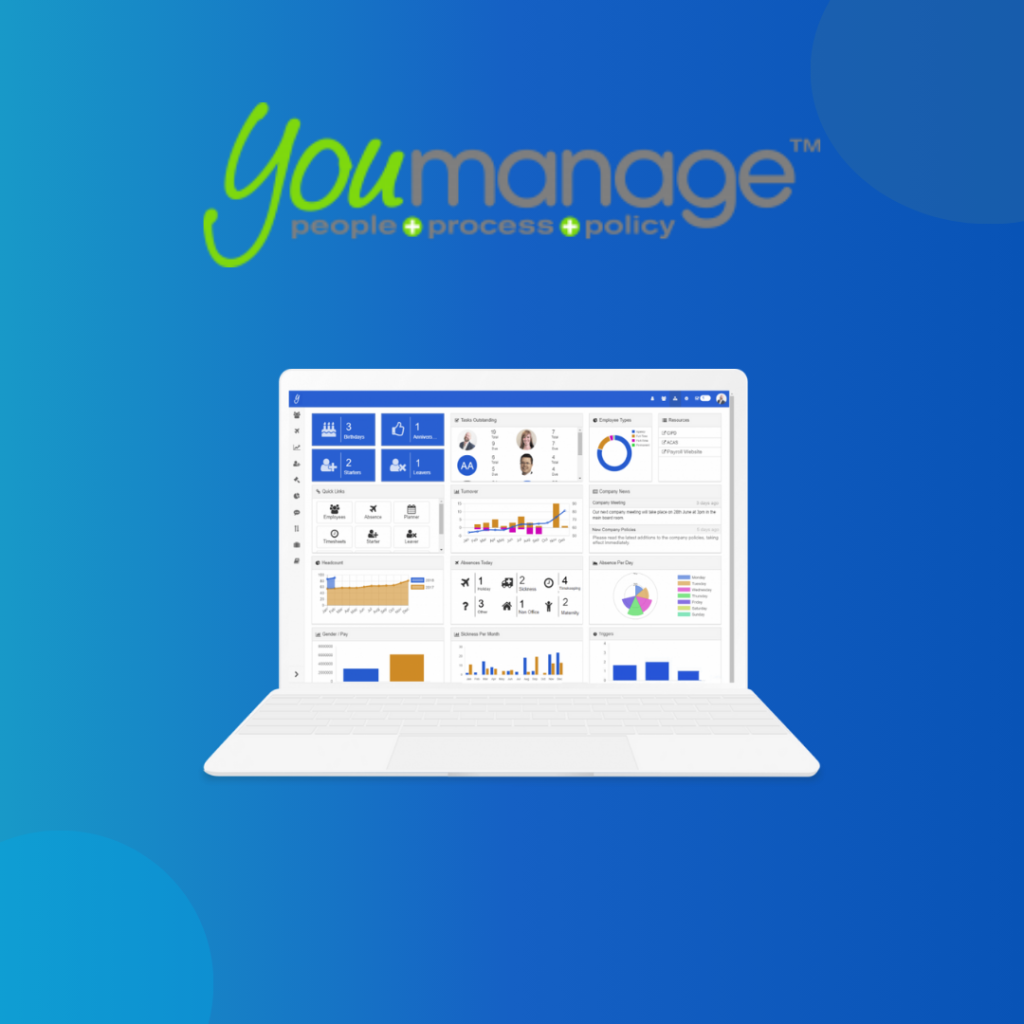
YouManage positions itself as an affordable, modular HR system for UK SMEs. While it does cover the core HR basics, its design leans more towards project timesheets and task-based tracking than rota-heavy or shift-based work. For businesses in hospitality, healthcare, manufacturing, or security, YouManage often feels too lightweight and may require bolting on other systems to plug the gaps.
Core features
Employee records: Centralised storage of personal data, documents, and contracts.
Absence & leave management: Track holidays, sickness, and approvals within the system.
Project timesheets: Employees can record hours against projects or tasks rather than just shifts.
Performance reviews: Basic appraisal tools and goal-setting.
Self-service portal: Staff can request leave, update records, and view their details.
Advanced features
Modular pricing: Businesses can switch on only the modules they want, which keeps entry costs low.
Workflow automation: Managers can set up approval chains for timesheets, leave, or document sign-offs.
HR reporting: Generate standard HR reports for absence, turnover, and employee data.
User permissions: Different access levels for line managers, HR, and staff.
Constraints and functionality gaps
Limited rota support: Scheduling and shift management are not a central strength — unsuitable for shift-heavy UK industries.
Time & attendance weak spots: Lacks GPS clock-in/out, biometric integration, or hardware support.
Payroll handoff: While you can export timesheet data, there’s no clear emphasis on HMRC RTI-ready payroll integration.
Reporting depth: Standard HR metrics are available, but more complex workforce analytics require manual workarounds.
Implementation: The modular design means businesses often have to piece together several modules to cover what’s included out-of-the-box in other systems (like Evalu-8 HR).
Pricing
YouManage starts from around £1.62 per employee/month, depending on the modules selected. While the headline cost is attractive, total spend can increase as soon as you need multiple modules to replicate a full HR system.
Pros & cons of YouManage
Pros:
- Low entry price makes it appealing for very small businesses.
- Project timesheet tracking is useful for professional services firms.
- Modular structure means you can avoid paying for unused features.
Cons:
- Weak rota and scheduling tools for UK shift-driven businesses.
- No real-time clock-in/out, GPS, or hardware integrations.
- Payroll integration not clearly mapped to UK compliance requirements.
- Can become more expensive once multiple modules are added.
Factorial
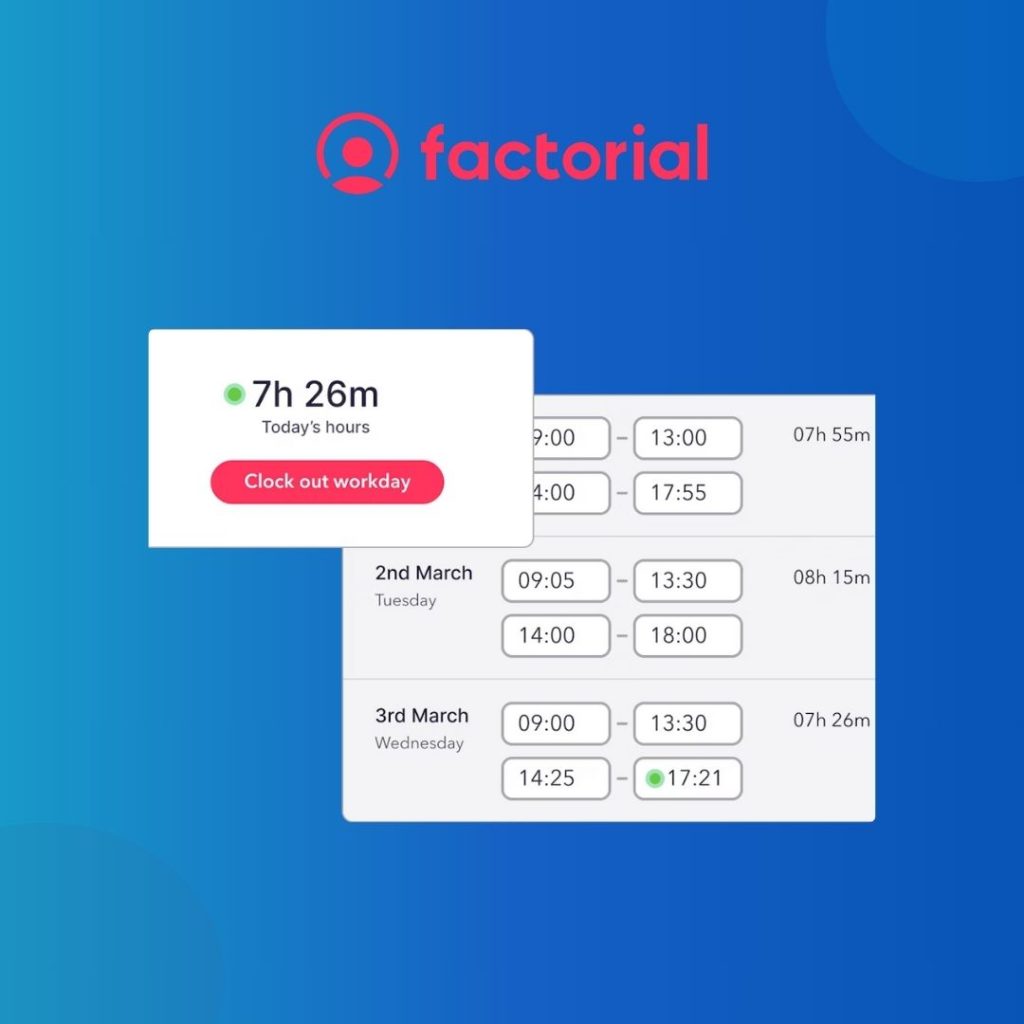
Factorial is a slick, modern HR platform with strong mobile usability and global reach. Its time tracking and scheduling features stand out for remote or distributed teams, especially with GPS and QR clock-in options. However, for UK SMEs, the platform can feel less tailored: payroll integration isn’t built around HMRC compliance, and costs can escalate quickly as more modules are added.
Core features
Employee records: Digital profiles with contracts, docs, and personal data.
Absence & leave management: Holiday booking, approvals, and absence tracking.
Time tracking: Employees clock in via desktop or mobile; timesheets generated automatically.
Shift scheduling: Plan and publish shifts, with staff able to view schedules online.
Performance management: Track objectives, feedback, and appraisals.
Advanced features
Geolocation tracking: Managers can see where employees clocked in/out.
QR code clocking: Teams can scan QR codes to record attendance, useful for multiple worksites.
Custom time policies: Restrict early/late punching, enforce breaks, and control overtime.
On-the-go mobile access: Employees manage leave, shifts, and clocking from their phones.
Integrations: Hooks into tools like Slack, Google Workspace, and Microsoft Teams.
Constraints and functionality gaps
Payroll alignment: Factorial integrates with some payroll tools, but direct HMRC RTI workflows aren’t clear, a gap for UK businesses needing compliance out of the box.
Escalating costs: The platform starts cheap but bundles key features (like advanced time tracking or document management) into higher-tier plans, which pushes up costs quickly.
Hardware devices: No published support for biometric readers, swipe-card systems, or terminals.
Reporting depth: Standard reports are included, but UK-specific compliance or payroll-prep reports aren’t as comprehensive as Evalu-8 HR.
Support focus: Being a global tool, support isn’t UK-specific, which can mean slower answers on UK employment law–related queries.
Pricing
Starts from around £5.40 per user/month for the core plan.
Pricing scales with add-ons and advanced features. Businesses often need higher tiers to unlock the full HR feature set, which erodes the initial affordability.
Pros & cons of Factorial
Pros:
- Modern, user-friendly interface.
- Strong mobile and remote workforce features (GPS, QR clocking).
- Integrates with popular productivity tools.
- Good for multi-site or hybrid working businesses.
Cons:
- Payroll not UK-focused; RTI alignment unclear.
- Costs escalate as you add modules or scale team size.
- No biometric or hardware clocking support.
- Reporting less tailored to UK compliance requirements.
- Support geared towards a global audience, not localised to the UK.
Staffology HR
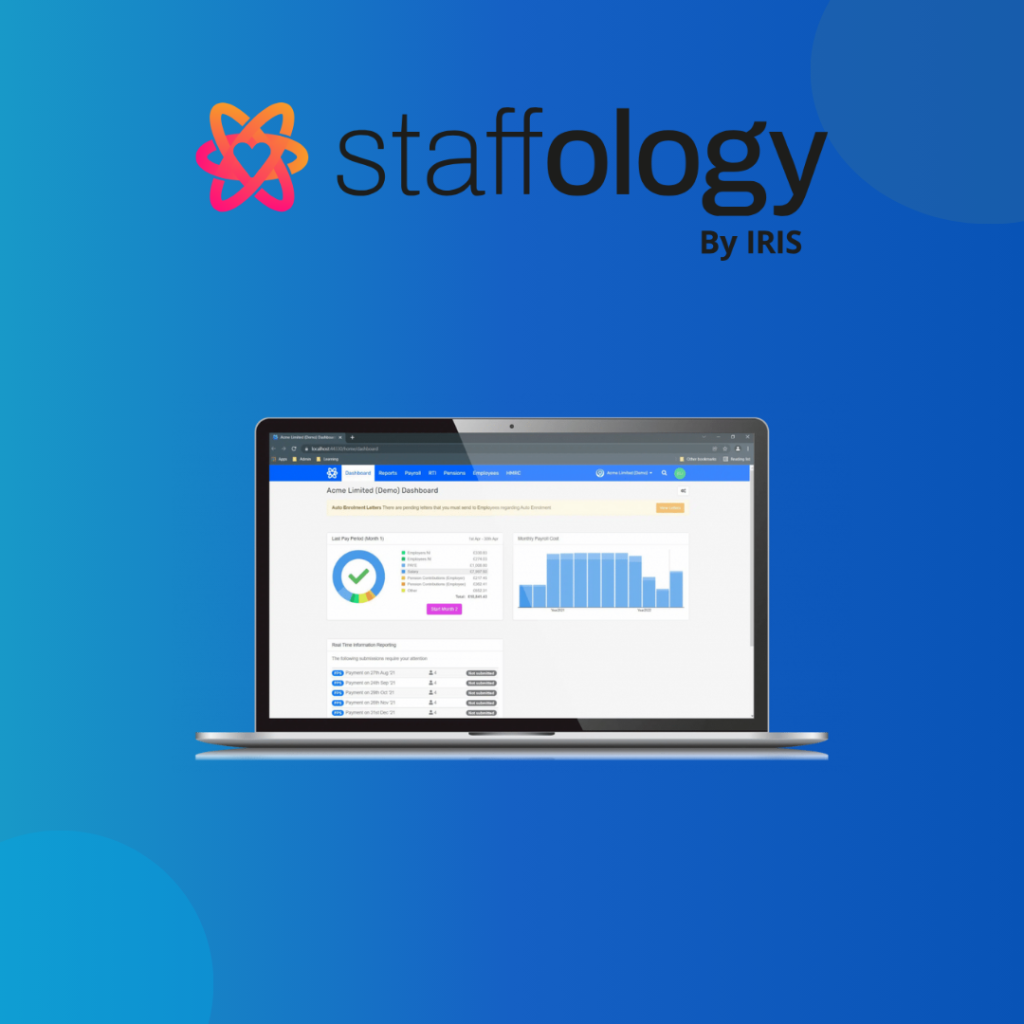
Staffology HR is part of the wider IRIS suite and is often paired with Staffology Payroll. For businesses already embedded in the IRIS ecosystem, it can feel like a natural extension. However, for SMEs looking for a straightforward HR platform, the product often feels more payroll-led than people-led. Pricing isn’t as transparent, and time and rota features are functional but lack the clarity and depth found in more SME-focused solutions.
Core features
Employee database: Stores contracts, documents, and compliance data.
Absence management: Tracks holidays, sickness, and leave approvals.
HR automation: Self-service portals and notifications for employees/managers.
Integration with Staffology Payroll: Attendance and absence data link into payroll to reduce re-keying.
Performance tools: Appraisals, objectives, and simple goal tracking.
Advanced features
Custom workflows: Automate approvals and reminders.
API access: For larger companies, APIs allow data integration with other IRIS systems.
Mobile app: Employees can request leave, update details, and access documents.
Onboarding support: Guided implementation packages are built in, useful for companies scaling up.
Constraints and functionality gaps
Pricing opacity: HR pricing is not listed transparently per user; instead, it’s bundled in packages, making it harder for SMEs to compare.
Time and rota functionality: While timesheets and absence tools exist, shift planning and rota automation are not heavily promoted or documented.
Hardware integrations: No advertised support for biometric devices or time clocks.
Reporting limitations: Standard reporting is available, but complex workforce insights require layering on additional IRIS tools.
Ecosystem lock-in: The product is most valuable when combined with Staffology Payroll or other IRIS products, which may limit flexibility if you want to use different providers.
SME accessibility: The language and packaging often feel more suited to mid-size businesses consolidating multiple IRIS services, rather than smaller firms buying HR software for the first time.
Pricing
Entry pricing starts from £7 per month (Foundation package) up to £59 per month (Ultimate package), excluding VAT.
Actual HR costs vary depending on modules and bundling, so SMEs may need to request tailored quotes.
Pros & cons of Staffology HR
Pros:
- Strong link with Staffology Payroll, reducing payroll admin if you’re in the IRIS ecosystem.
- Guided onboarding and implementation support.
- HR automation and self-service portals for employees.
- APIs available for custom integrations.
Cons:
- Pricing structure isn’t transparent per user; total costs can be unclear.
- Shift/rota management not a major focus weaker for businesses needing robust workforce scheduling.
- Lacks visible hardware or biometric clocking options.
- Feels heavier and more complex for SMEs not already using IRIS products.
Want to find out how to improve your HR? Get a call back from an expert
MyHRtoolkit
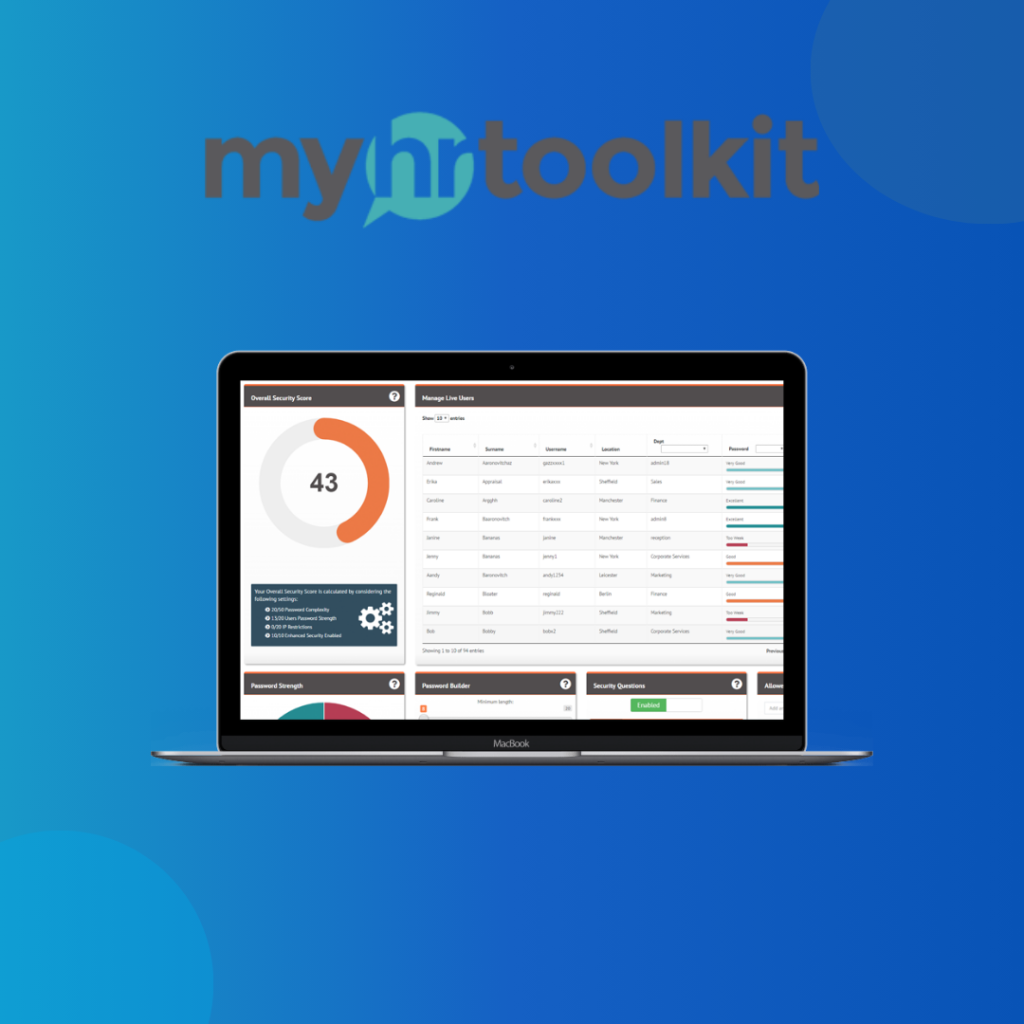
MyHRtoolkit is a UK-based HR platform aimed squarely at small businesses that want a simple, no-fuss system. Its biggest selling point is its “all features included” pricing model and straightforward setup. However, the simplicity can quickly become a limitation, especially for rota-heavy or compliance-driven industries that need more advanced scheduling, reporting, or integrations.
Core features
Employee records: Centralised digital storage of staff information, contracts, and documents.
Absence management: Track holidays, sickness, and leave allowances automatically.
Timesheets: Employees log hours worked, which feed into holiday accrual for variable-hour staff.
Self-service portal: Staff can view their records, request leave, and manage their information online.
Performance basics: Simple appraisal tracking and reminders.
Advanced features
All-in pricing: Every customer gets the full feature set, no bolt-ons or hidden extras.
Rolling monthly contract: Flexible commitment, which suits very small businesses that don’t want long-term lock-ins.
User-friendly dashboard: Clean, straightforward interface that works well for companies new to HR software.
Document management: Upload, share, and control key HR documents within the system.
Constraints and functionality gaps
Rota and shift planning: Very limited, not designed for industries where scheduling is complex.
No real-time clock-in/out: Attendance is tracked through manual timesheet entry, not live data.
No GPS or hardware clocking: Lacks geofencing, biometric, or swipe-card support.
Payroll handoff: Exporting data is possible, but not designed around HMRC-compliant payroll integration, additional manual work may be required.
Reporting: Limited compared to more advanced HR systems; analytics are basic.
Scalability: The platform is geared towards micro to small businesses; growing SMEs may outgrow its capabilities quickly.
Pricing
MyHRtoolkit uses a straightforward per-employee, per-month pricing model with all features included as standard. There are no bolt-ons or hidden extras, and contracts run on a rolling monthly basis, giving SMEs flexibility to scale up or down as needed. While the transparency is appealing, the flat structure does mean smaller businesses may end up paying for features they never fully use.
Pros & cons of MyHRtoolkit
Pros:
- Clear and predictable pricing, everything included.
- Flexible contracts (monthly, no long-term tie-ins).
- Easy to set up and use, even for companies new to HR systems.
- UK-based vendor with a focus on SMEs.
Cons:
- Weak for rota or shift-heavy businesses.
- No live clock-in/out, GPS, or hardware integrations.
- Limited reporting and analytics.
- Scalability concerns, growing companies may need to switch platforms later.
Moorepay
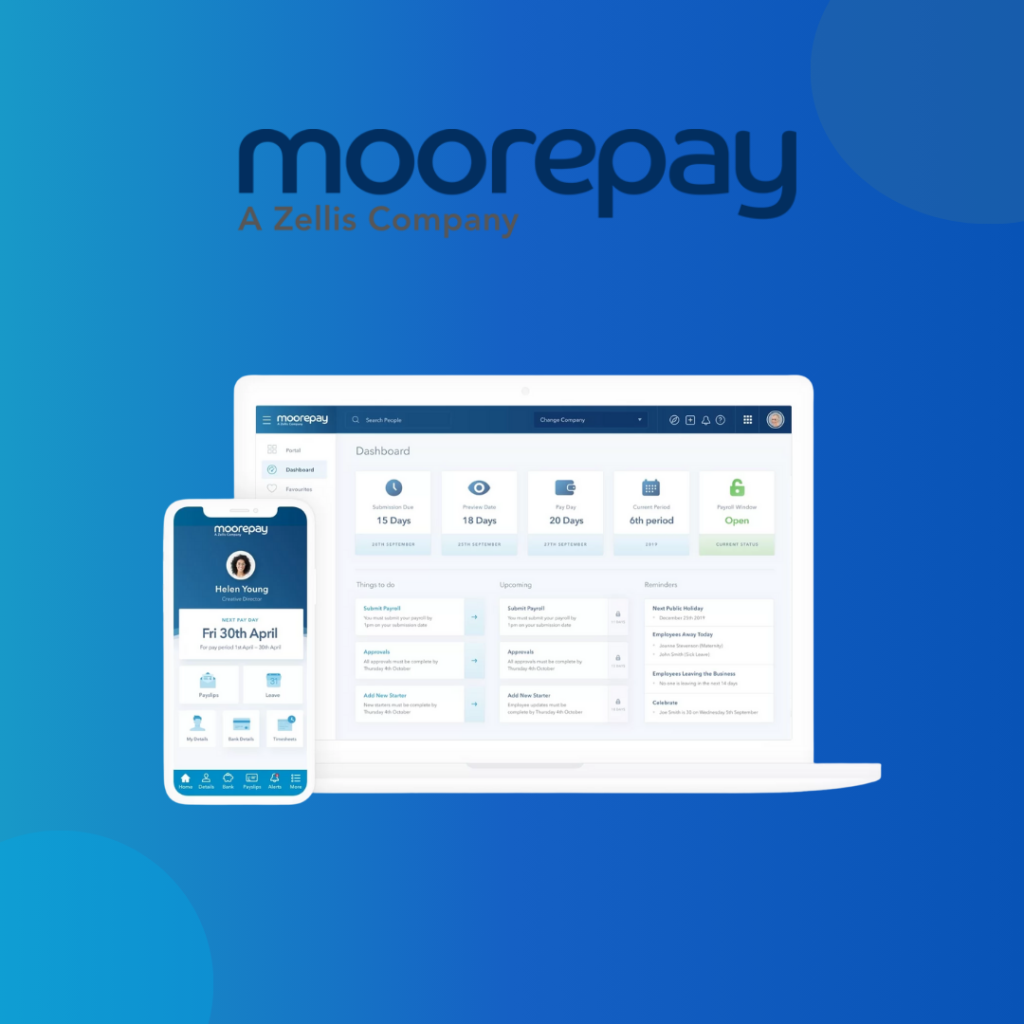
Moorepay is a well-known name in the UK for payroll and HR services, now part of the Zellis Group. Its HR platform is typically bundled with managed payroll services, which makes it appealing to larger organisations wanting an outsourced model. However, for SMEs that just want a straightforward HR system, Moorepay can feel heavy, expensive, and less flexible. Pricing is not published and usually requires a sales process, making it hard for smaller businesses to benchmark.
Core features
HR records: Centralised employee data and document management.
Absence & holiday tracking: Automated leave requests and approvals.
HR compliance tools: Policies, documents, and reminders to help manage HR risk.
Integrated payroll: HR data feeds directly into Moorepay’s payroll service.
Performance management: Goal-setting and employee reviews.
Advanced Features
Time & attendance module: Can be added for more detailed shift and time tracking, integrated with payroll.
Employee self-service: Staff can view payslips, update personal data, and request leave.
Analytics & dashboards: Insights into workforce data, absences, and payroll costs.
API integrations: Data links available for larger organisations with complex systems.
Outsourced HR support: Moorepay offers access to consultants and legal advice as part of some packages.
Constraints and functionality gaps
Pricing opacity: Costs are entirely quote-based, so SMEs cannot easily compare against alternatives.
Heavy implementation: Set-up can feel over-engineered for SMEs that just want plug-and-play HR software.
Tied to payroll: While integration with Moorepay Payroll is seamless, businesses using other payroll providers lose a key advantage.
Time & attendance not central: It exists as a module, but isn’t a core focus of the system.
SME fit: The product often feels like it’s aimed at mid-to-large organisations, leaving smaller companies paying for features they don’t need.
Hardware integrations: Details on biometric readers or clocking devices aren’t advertised, creating uncertainty for businesses that require them.
Pricing
Moorepay does not publish standard pricing; costs are determined via a tailored quote, usually bundled with payroll and HR services. This approach makes it harder for SMEs to gauge affordability upfront and often results in higher ongoing costs than more modular, transparent alternatives like Evalu-8 HR.
Pros & Cons of Sage HR
Pros
- Established UK brand with a strong reputation in payroll.
- Integrated payroll and HR can reduce admin for larger companies.
- Access to outsourced HR and compliance support.
- Broad functionality for mid-sized to larger businesses.
Cons
- Quote-only pricing with limited transparency.
- Setup can be complex and resource-heavy for SMEs.
- Time & attendance is a bolt-on, not a core feature.
- Best value is only realised if you also adopt Moorepay’s payroll services.
- Can feel oversized for SMEs with straightforward HR needs.
Ciphr

Ciphr is a long-established UK HR software provider that positions itself as a mid-market solution. It offers a broad suite of HR, payroll, and recruitment modules, and it’s highly configurable. However, the flexibility comes at a cost: pricing is not transparent, implementation is typically lengthy, and many businesses find the system better suited to organisations with hundreds of employees rather than SMEs. For smaller firms, it often feels overly complex and expensive.
Core features
Employee records: Secure storage of staff data, contracts, and compliance documents.
Absence management: Tracks annual leave, sickness, and other types of absence with workflows for approvals.
Recruitment and onboarding: Applicant tracking and digital onboarding tools.
Learning management: Optional module for training and compliance tracking.
Payroll: Integrated payroll service for organisations that want HR and pay combined.
Advanced features
Highly configurable workflows: Customisable processes for approvals, document management, and employee lifecycle tasks.
Analytics and dashboards: Advanced workforce reporting for larger organisations that need detailed insights.
API integrations: Strong integration capabilities, allowing Ciphr to connect with third-party systems.
Talent management: Modules for performance, succession planning, and employee engagement surveys.
Cloud-based hosting: Accessible online with enterprise-grade security.
Constraints and functionality gaps
Pricing opacity: Ciphr operates on a quote-only basis, making it hard for SMEs to compare costs against other vendors.
Complex implementation: Setup can take months, with significant resource requirements from the client side.
Better for mid-sized businesses: Many SMEs will find the platform unnecessarily heavy and feature-rich for their needs.
Modular but expensive: While modularity is a strength, the cost of adding multiple modules adds up quickly.
Payroll dependency: Works best when combined with Ciphr Payroll; integration with external payroll providers may be less seamless.
User experience: While functional, the interface feels less modern compared to newer entrants like Factorial or Evalu-8 HR.
Pricing
Ciphr does not publish standard pricing. Costs are based on tailored quotes, which vary depending on the number of employees and modules selected. As a mid-market solution, Ciphr often comes in at a higher price point than SME-focused alternatives such as Evalu-8 HR.
Pros & Cons of Roubler
Pros
- Broad HR, payroll, and recruitment capabilities in one platform.
- Highly configurable for larger or complex organisations.
- Strong analytics and integration options.
- Established UK provider with experience in compliance-heavy industries.
Cons
- Quote-only pricing with limited transparency.
- Implementation is time-consuming and resource-heavy.
- Overkill for many SMEs; feels designed for companies with 250+ employees.
- Costs escalate quickly as modules are added.
- Less modern and user-friendly interface compared to newer platforms.
Sage HR

Sage HR is a well-recognised name in the UK market, particularly among SMEs already familiar with Sage’s accounting and payroll products. It offers a wide range of HR features packaged into modules, making it flexible on paper. However, the modular pricing can be confusing, and the platform often feels like a bolt-on to Sage’s wider ecosystem rather than a standalone HR system. For smaller businesses, the reliance on mixing and matching modules can push costs higher than expected.
Core features
Employee database: Centralised records for staff details and documents.
Absence & holiday management: Simple request and approval workflows for leave and sickness.
Performance reviews: Goal setting, appraisals, and feedback tools.
Recruitment module: Applicant tracking and onboarding features.
Employee self-service: Staff can access records, book leave, and update details.
Advanced features
Shift scheduling and timesheets: Build rotas, assign shifts, and track hours worked.
Expense management: Capture, submit, and approve expenses digitally.
Mobile app: Employees can access HR services on the go.
Integrations: Links with Sage Payroll and Sage Accounting for existing Sage customers.
Custom workflows: Automate approvals and HR tasks to save admin time.
Constraints and functionality gaps
Pricing complexity: Costs vary depending on which modules are selected, making it harder for SMEs to predict total spend.
Value gap for SMEs: While modularity gives choice, most small businesses end up needing several modules, which reduces the initial affordability.
Payroll focus: Works best when paired with Sage Payroll, which may not be relevant for companies using other providers.
User experience: Functional but less intuitive compared to newer entrants like Factorial or Evalu-8 HR.
Support: UK support exists, but customer reviews suggest response times can vary.
Hardware support: No obvious emphasis on biometric or terminal integrations for attendance.
Pricing
Sage HR uses a modular pricing model where you pay per user, per month for the specific features you need (such as absence management, scheduling, or performance). While this can keep entry costs low, SMEs often find they need multiple modules, which quickly increases the overall price. Sage offers a 30-day free trial but does not publish clear bundle pricing.
Pros & Cons of Employment Hero
Pros
- Recognisable brand with strong UK presence.
- Flexible module-based approach lets you pick features.
- Good payroll/accounting integrations for existing Sage customers.
- Wide functionality covering HR, performance, expenses, and scheduling.
Cons
- Pricing can become confusing and escalate as modules are added.
- Works best with Sage Payroll, reducing flexibility for non-Sage users.
- Interface feels less modern compared to newer alternatives.
- Hardware/biometric time tracking not a visible focus.
- Support quality can be inconsistent.
HRLocker
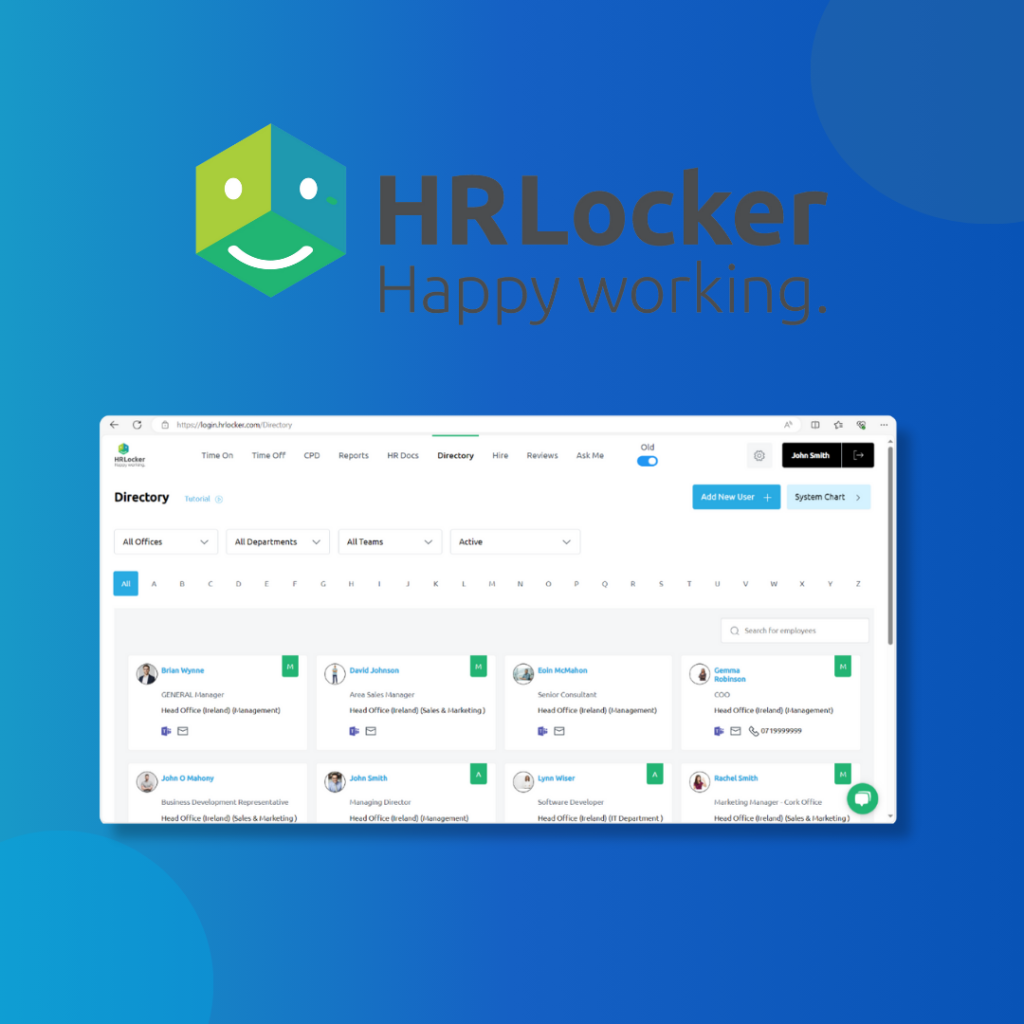
HRLocker is an Irish-based HR platform with a growing UK presence, designed mainly for SMEs. It offers a mix of HR basics, timesheets, and optional add-ons like recruitment and learning. While it provides useful tools such as GPS clocking and IP restrictions, the platform can feel piecemeal and inconsistent. Pricing varies by plan and add-on, which makes it harder to benchmark, and the overall experience is less polished compared to more UK-focused providers like Evalu-8 HR.
Core Features
Employee database: Store personal information, contracts, and compliance records.
Absence & leave management: Track holiday, sickness, and other leave types.
Timesheets: Employees can clock in/out or manually enter hours.
Performance basics: Objectives, appraisals, and review tracking.
Recruitment (ATS): Optional module for managing job postings and applicants.
Advanced Features
GPS location capture: Allows managers to verify where employees clock in/out.
IP whitelisting: Restrict clock-ins to approved locations or devices.
Web, mobile, and kiosk access: Multiple ways for employees to interact with the system.
Add-on flexibility: Recruit, learn, or performance modules can be bolted on as needed.
Data warehouse (higher tiers): Advanced reporting and data analysis for larger businesses.
Constraints & Functionality Gaps
Pricing opacity: Pricing is listed in euros with multiple tiers and add-ons, making it harder for UK SMEs to benchmark in GBP.
Scattered feature set: Useful features exist but feel fragmented across plans, leading to an inconsistent user experience.
Hardware support: No strong emphasis on biometric or swipe-card terminals.
Payroll integration: Not a clear strength, requires additional checks for UK payroll compatibility.
UI/UX polish: Functional but not as modern or intuitive as newer HR systems.
SME suitability: While flexible, some SMEs may find the product lacks the simplicity and clarity of other SME-first platforms.
Pricing
HRLocker’s pricing is tiered and displayed in euros, starting from around €4 per employee per month for the Essentials package, with higher tiers listed as “POA” (price on application). Costs increase with add-ons such as recruitment or learning modules. UK buyers should request a tailored quote, as pricing isn’t straightforward.
Pros & cons
Pros
- GPS and IP-based clocking controls useful for field-based teams.
- Multiple access options (web, mobile, kiosk).
- Modular with optional recruitment and learning add-ons.
- Affordable entry point for basic HR needs.
Cons
- Pricing is inconsistent, non-transparent, and listed in euros.
- Features can feel fragmented across tiers and add-ons.
- Payroll integration is unclear for UK buyers.
- Lacks emphasis on biometric/hardware device support.
- The interface is less modern compared to competitors.
Overview of Top 10 BreatheHR Alternatives for UK Businesses in 2025
Many businesses begin with BreatheHR but later search for alternatives when they need more scalability, stronger rota and payroll features, or UK-specific compliance support. Leading options include Evalu-8 HR, Factorial, Ciphr, Moorepay, Sage HR, MyHRtoolkit, HR Locker, Staffology, and YouManage. Among these, Evalu-8 HR stands out as the best all-round option, offering modular pricing and powerful HR, rota, and compliance features designed for UK organisations.
The right choice will always depend on factors like business size, feature requirements, and budget, but for most SMEs, Evalu-8 HR offers the most balanced and future-proof solution.
Comprehensive HR & Payroll Platforms (Mid-to-Large Businesses)
Evalu-8 HR: Flexible, modular, and UK-focused. Offers everything from HR and compliance to rota scheduling and time & attendance, making it adaptable to both mid-sized and larger businesses.
Ciphr: Enterprise-grade HR software with deep integration capabilities and customisation, best for organisations needing a highly tailored setup.
Moorepay: Known for payroll strength, particularly suited to businesses that prioritise reliable payroll alongside HR.
Integrated & Flexible Solutions (Small-to-Midsize Businesses)
Evalu-8 HR: Starts affordably (£2.50 per user) and grows with your needs. Perfect for SMEs who want control over which modules they add over time.
Factorial: A European-based HR platform with modern design and tools for absence, onboarding, and performance management.
HR Locker: Popular with SMEs for its simplicity and ease of use, offering core HR and compliance functions.
MyHRtoolkit: Designed for smaller businesses with straightforward HR, document storage, and absence tracking.
Specialist & Niche-Focused Solutions
Evalu-8 HR: Particularly strong in rota, time & attendance, and compliance-heavy sectors, helping SMEs unify HR with workforce management.
Sage HR: Works well for companies already using Sage payroll, offering scheduling, HR, and expense management.
Staffology: A payroll-first solution, useful for businesses that want advanced payroll capabilities with HR as an add-on.
YouManage: Tailored to SMEs, providing a balance of HR functionality and straightforward user experience.
How to Choose the Best Alternative
Assess Your Needs: Decide whether you need global payroll, an all-in-one HR system, or just core HR essentials.
Consider Business Size: Some platforms are built for enterprises, while others are perfect for SMEs and startups.
Evaluate Features: Focus on what matters most: time tracking, compliance, recruitment, benefits, or rota management.
Check Pricing & Support: Make sure the platform fits your budget and provides responsive customer service.
How I chose the best Breathe HR alternatives software for UK businesses
To build this list of the most useful HR software platforms for the UK in 2025, I focused on what really matters to business owners and managers juggling compliance, payroll, and people management.
First, I narrowed down the must-haves:
Core HR records: A centralised place to store employee data, contracts, and compliance documents securely.
Absence and leave management: Clear, automated tracking of holidays, sickness, and other absences with approval workflows.
Performance reviews: Tools to manage appraisals, objectives, and employee development.
Document management: Ability to issue, store, and e-sign HR policies and contracts.
Payroll readiness: Simple exports or integrations that make UK payroll processing faster and more accurate.
Then, I considered the practical things that make these tools usable every day:
User-friendly interface: If the software feels clunky, managers and staff won’t use it consistently.
Mobile access: With remote and hybrid work now the norm, HR tasks like booking leave or accessing documents need to be mobile-friendly.
Scalability: The system should be flexible enough to support a 10-person company today, and still fit a 100-person business tomorrow.
Pricing clarity: UK SMEs need transparency. Platforms that hide costs behind quotes or add-ons create uncertainty.
Finally, I looked for advanced features that separate the good from the great:
Rota and scheduling tools: Beyond simple leave tracking, the ability to plan and manage shifts is critical in many industries.
Time and attendance tracking: Integrated clock-in/out, timesheets, or geolocation features for accurate payroll and compliance.
Compliance monitoring: Tools that help UK employers meet GDPR, Working Time Regulations, and other legal obligations.
Advanced reporting: Dashboards and analytics that show absence trends, labour costs, and workforce performance.
Integration ecosystem: Seamless links with payroll providers, accounting software, or other business tools.
Employee self-service: Staff should be able to update records, book leave, or check schedules without going through HR.
Why Evalu‑8 HR came out on top
While many platforms cover the basics, Evalu-8 HR stood out for its balance of affordability, flexibility, and UK compliance focus. Its modular design means SMEs only pay for the features they need, whether that’s core HR, rotas, performance, or time and attendance, while keeping everything in one place.
Evalu-8 combines advanced rota planning, absence and performance management, payroll prep reporting, and compliance monitoring in a single, intuitive system. Plus, with transparent pricing starting from £2.50 per licence per month, mobile access, and powerful reporting, it’s built with UK SMEs in mind.
For businesses that want a system that grows with them, without the hidden costs or complexity of larger vendors, Evalu-8 HR leads the pack as the best BreatheHR alternative for 2025.
Final thoughts
Finding the right HR software is less about ticking boxes and more about choosing a system that fits the way your business really works. Every platform we’ve reviewed here offers something of value, from Factorial’s sleek mobile app to Ciphr’s enterprise-level configurability. But each also has drawbacks, whether that’s opaque pricing, weak UK payroll support, or features that feel oversized for SMEs.
For UK businesses, the key priorities are usually the same:
Keeping employee data secure and compliant.
Managing absences and rotas efficiently.
Ensuring payroll is accurate and stress-free.
Scaling up without being forced into unnecessary complexity or hidden costs.
That’s where Evalu-8 HR stands out. It’s modular, affordable, and built with UK regulations and SME realities in mind. You can start small with the essentials and add more advanced modules like performance, rotas, or compliance reporting as your business grows. And because everything connects in one system, you avoid the duplication and data silos that trip up so many businesses.
If you’re looking for a genuine alternative to BreatheHR in 2025, one that balances usability, compliance, and transparency, Evalu-8 HR deserves to be at the top of your shortlist.
Want to learn more about Evalu-8 HR?
Fill out the form below, and a member of our friendly team will assist you
FAQs
The best alternative depends on your business size and needs. For most SMEs, Evalu-8 HR stands out because it’s UK-built, modular, and affordable, you only pay for what you need, whether that’s absence tracking, rotas, or performance management.
Many businesses start with BreatheHR but later need more advanced features such as rota scheduling, time and attendance, payroll prep, or compliance reporting. Others want clearer pricing or a system that scales as their workforce grows.
Prices vary widely. Some providers start as low as £1–£2 per user per month, but often with limited functionality. Mid-market vendors require quotes and can cost significantly more. Evalu-8 HR offers transparent pricing from £2.50 per user per month, with modular add-ons so you only pay for what you need.
At a minimum: employee record management, absence tracking, document storage, and payroll prep. For growing SMEs, rota management, time and attendance, compliance monitoring, and performance management are also key. Mobile access and transparent pricing are essential for day-to-day usability.
Platforms designed with UK regulations in mind, like Evalu-8 HR, are best for ensuring compliance with GDPR, HMRC payroll standards, and the UK Working Time Regulations. Global tools such as Factorial can be strong on usability but often lack UK-specific compliance depth.
